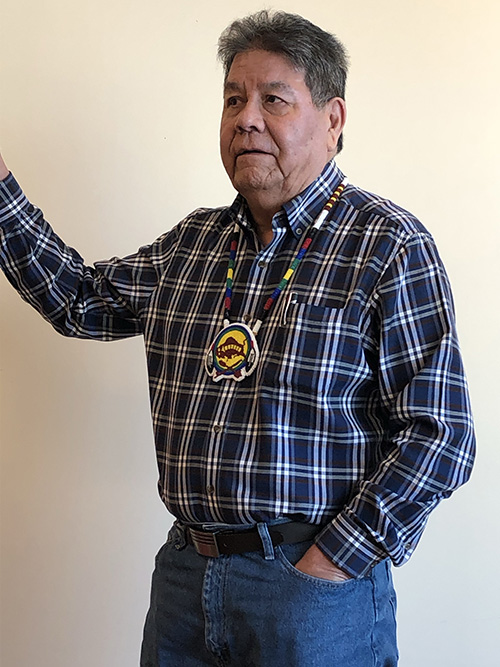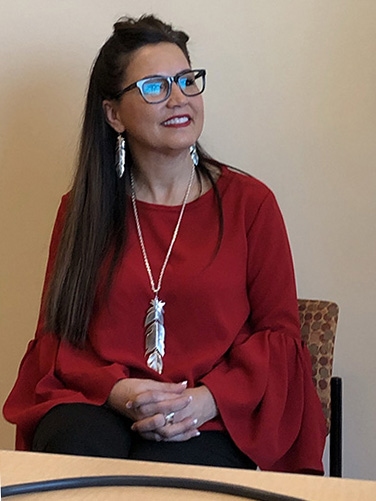Misunderstood to Understood to Understand
"From Misunderstood to Understood to Understand" was the name of the presentation. And it was shared by Roy Bear Chief, an elder-in-residence at Mount Royal University and Audra Foggin, assistant professor in the Department of Child Studies and Social Work with a group of social workers at Alberta Children's Hospital. Their goal was to further reconciliation among healthcare professionals who often serve Indigenous Peoples.
 Bear Chief who is called "Espoom tah" (helper) in the Department of Child Studies and Social Work explained that the name of the presentation "From Misunderstood to Understood to Understand" was important because it speaks to the choice of taking a journey.
Bear Chief who is called "Espoom tah" (helper) in the Department of Child Studies and Social Work explained that the name of the presentation "From Misunderstood to Understood to Understand" was important because it speaks to the choice of taking a journey.
The conceptual model developed by Bear Chief begins with "misunderstood," which in Blackfoot is "nimah to ko tsi ta pim mawa" which means, "I don't understand them at all. "Understood" is "nikoh mata po tsi ta pim mawa" which means, "I am starting to understand them"; and finally, "understand" is "niko tsi ta pim mawa" which means, "Now, I understand them."
To take this journey, Bear Chief said people must reflect on their own biases, prejudices, attitudes and behaviours shaped by world views about Indigenous Peoples, immigrants, gays/lesbians and other minorities. He explained that the journey is worthwhile to addressing reconciliation because it speaks to it being a shared responsibility.
For Bear Chief, the day of the presentation began with a pleasant surprise for the name of the street leading to the main entrance of the hospital is "Oki" Drive. "Oki" is the Blackfoot word for "hello."
True to this warm welcome, the presentation was successful. Together Bear Chief and Foggin suggested approaches to alleviate misunderstanding, connected theory to practice and invited each person to consider what they could do as part of the 94 Calls to Action from the Truth and Reconciliation Commission of Canada.
 Foggin's explained to the group that "Indigenous individuals, families and communities have experienced intergenerational trauma as well as discrimination, racism and oppression. This collective trauma and loss among Indigenous Peoples has been widespread due to historical colonization and structural oppression."
Foggin's explained to the group that "Indigenous individuals, families and communities have experienced intergenerational trauma as well as discrimination, racism and oppression. This collective trauma and loss among Indigenous Peoples has been widespread due to historical colonization and structural oppression."
Bear Chief and Foggin then shared their own lived experience (Bear Chief as a residential school survivor and Foggin as a 60s scoop survivor within the child welfare system), their cultural wisdom and their academic knowledge as social workers.
The group was appreciative. From facilitator, Michael Watts, came the feedback that he and his colleagues were humbled by their passion, wisdom, insights and humility.
For Foggin, this passion comes from working with and for First Nations in group homes, hospitals and Child Welfare over many years. She said, "This work created an understanding of culture, needs, challenges and strengths within Indigenous families and communities. I also saw where misunderstandings come from biases, lack of understanding and lack of learning about Indigenous Peoples."
As part of the presentation, participants were asked to consider and discuss what they could do to promote understanding and build relationships. Watts said that hours after the talk, he overheard multiple colleagues discussing ways in which they could incorporate more Indigenous awareness into their respective clinics and practice.
"Being able to share and encourage social workers to carry forward social justice and social action is exciting," said Bear Chief. He felt participants were meaningfully engaged and came away with a better understanding of Indigenous children, families and community.
Bear Chief describes reconciliation in Blackfoot as, "Aakoo ka na sksi tso ko watsi yopa iiso tsiika-iito mata kiita!" or "We will all be friends again in the future-believe in it!

